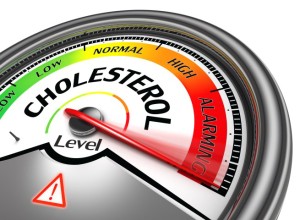Do You Have High Cholesterol?
There are a number of things that could be happening inside your body that you may not even know exists. While some medical conditions are associated with clear warning signs and symptoms that can alert the need to consult your doctor, this doesn’t apply to everything – especially when it pertains to your cholesterol. The body produces all of the cholesterol it needs, but certain foods contain large amounts of cholesterol as well. When a person has a high concentration of cholesterol in their blood, it can increase their chance of heart disease and be potentially fatal should an occurrence of heart attack occur. On top of all that, high cholesterol doesn’t have any symptoms or warning signs, so many people aren’t aware if their levels are considered at risk or not. The providers of Abraham Family & Geriatric Medicine want to make sure you lead the healthiest and happiest lifestyle possible, but do you know if you have high cholesterol or not?
 What is high cholesterol?
What is high cholesterol?
Cholesterol is a wax-like, fatty substance that’s found in the blood and used to help build healthy cells that make hormones, Vitamin D, and other aids for food digestion. There are two main types of lipoproteins (small packages of lipids/fat encased in proteins), that help the cholesterol travel through the blood:
- Low-density lipoprotein (LDL) – considered the “bad” form of cholesterol that builds up within the artery’s walls, causing them to harden and narrow. The more LDL you have, the greater your chance of heart disease.
- High-density lipoprotein (HDL) – considered the “good” form of cholesterol that transports extra cholesterol back into the liver.
The main concern with having a higher level of LDL is that it can cause blood clots to form that can ultimately restrict oxygen-rich blood from getting to the heart. Once oxygen is restricted from the heart muscle, it can create lead to chest pain, stroke, or heart attack. Without proper treatment, and very quickly, heart attacks and strokes can lead to serious health problems or even be fatal.
How is high cholesterol treated?
The only way to accurately get a read on your cholesterol levels is by performing a diagnostic blood test after the patient has fasted (meaning no eating or drinking). The blood test will give a report on total cholesterol, LDL cholesterol, HDL cholesterol, and triglycerides (a type of fat within the blood). Measured in milligrams (mg) of cholesterol per deciliter (dL) of blood, the general guide we use for our patients is:
- Below 200 mg/dL – good
- 200-239 mg/dL – borderline high
- 240+ mg/dL – too high
Typically, patients who have a family history of high cholesterol, have chronic heart disease, high blood pressure, or diabetes, it may be recommended to have their cholesterol levels tested more frequently than others. Testing is generally suggested every four to six years for patients without preexisting conditions or family history, but we would say to ask your doctor if you’re concerned or just want to have that peace of mind.
If it’s determined that you fall within the “too high” range, and despite your best efforts to make a healthy lifestyle change, if your cholesterol levels remain high, medication may be recommended. There are various medication and supplements available today, and we would help you determine which one is best suited for your individual needs.
Can high cholesterol be prevented?
High cholesterol can come from a number of risk factors but the most common include: poor diet and exercise, obesity (a BMI of 30+), diabetes, and smoking, however, genetics also plays a role. The good news is that these risks can be managed with preventative treatment, or a healthy lifestyle change to be more specific! If you have high cholesterol, you can lower your levels by:
- Paying close attention to the types of foods you consume – choose healthier fats (avocados, almonds, pecans, etc.), avoid trans fats (often found in margarines and commercially-baked goods), choose whole grains, load up on fruits and vegetables, add more heart-healthy fish (salmon, mackerel, and herring), quit smoking, and limit your alcohol consumption.
- Maintaining a healthy weight. Extra weight on your body can contribute to higher levels of cholesterol, so even dropping a few pounds can help lower this number. Exercise has amazing health benefits in general, so it should already be incorporated into your active lifestyle, but if it isn’t, it’s never too late to start.
- Exercise frequently. You don’t necessarily need to train for a marathon to reduce your likelihood of having high cholesterol, but carving out 30-60 minutes of exercise several days a week is ideal.
Right now, you can take part in a clinical trial sponsored by Pfizer for a new lipid lowering medication, right here at Abraham Family & Geriatric Medicine! If you are a patient with high cholesterol and are interested in participating in this clinical research study, call Lisa Gordon, CCRC at 770-238-1593 for more information.
